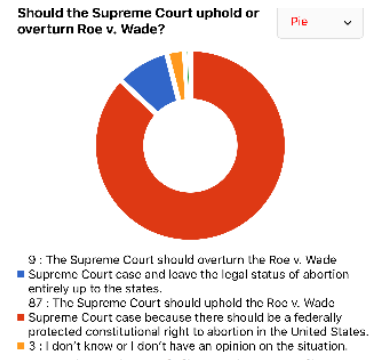Students React to Supreme Court Leak

June 1, 2022
A confidential Supreme Court draft opinion to overturn Roe v. Wade was obtained by Politico and released to the public on May 2 — the overturning of Roe v. Wade would leave the decision for abortion laws up to each state, giving legislators substantial power to limit abortion rights.
At Poly, students in the Upper School and Middle School approached discussions about this national news differently. Providing an option for Upper Schoolers to discuss this matter “felt particularly necessary because of the radical nature of the potential change in this particular case,” wrote history department chair Maggie Moslander in an email to the Polygon. The Middle School, on the other hand, was not provided an environment for discussion generally because of complications due to their age.
Upper School students were emailed an invitation to an optional conversation led by Moslander during a DEIB block three days after the leak. “I think it’s always helpful for students to have a place to come discuss and learn from faculty and from each other in an informal way; it helps us build a culture of conversation that leads to deeper understanding,” wrote Moslander. About a dozen students, along with a handful of faculty, attended the discussion.
Head of Middle School André Del Valle said in an interview regarding a Middle School conversation about the draft leak, “That won’t happen this year. At this point to take the curriculum and any course off of the track that it’s on to then shift toward [a discussion of the draft leak] would eliminate a lot of the things that teachers are doing with the rest of the year. In talking to the history department chair [Moslander] we both decided that the timing was not right.”
Del Valle further discussed the reasoning behind the decision to not discuss the topic with the Middle School. “Whenever you are dealing with any sensitive topic like that, there is a lot of pre-knowledge and discussion that needs to be laid out before you just jump to a discussion about the leak,” Del Valle said. “Obviously sometimes kids might hear faculty talking about it. Typically in cases like that whenever it is something as controversial as talking about someone’s own personal beliefs, we typically shy away from having adults lead those conversations because we don’t want kids to take away from a discussion to say ‘my teacher feels this way so maybe I should feel this way,’ or the complete opposite, where this teacher’s beliefs fall differently than [the student’s] own or [their] families,” he said.
Some Middle School students, however, still have questions. “I know the pro-life vs. pro-choice thing has been going on for a while but I haven’t heard much about anything else,” said 8th-grade student Madeline Gross.
“Is something happening in the Supreme Court? I didn’t know anything was happening,” said 6th grader Tony Pasquariello.
Eliza Rorech, an eighth-grader, was aware of the news and said, “Roe v. Wade is being talked about in the Supreme Court and might be overturned…it is important to talk about these things to educate students about what’s going on.”
In an effort to gather student opinions, the Polygon sent out a survey to Upper School students and asked what they believed the outcome of the case should be. Students were asked to record their religions to indicate the religious diversity of the sample.
Overall, the sample represents 113 anonymous Upper School students and the religions of those who participated. Forty-six survey respondents are unaffiliated with religion, 31 respondents are Jewish, and 19 are Roman Catholic. (The last 16 percent of answers represented too few students affiliated with various religions and therefore would not be representative of the relationship between the student’s religious beliefs and opinion on the Supreme Court leak.)
The majority opinion of the 113 respondents was that 88.4 percent (99 students) were against the proposal to overturn the case. Most student responders did not support the majority opinion in the draft, and many advocate for the upholding of Roe.
“There should be a constitutional right for abortion because of the tremendous impact of raising a kid and even the impact that pregnancy itself has on women. A lot of families can’t afford to raise a child, yet [anti-abortion advocates] don’t take the steps to ameliorate the foster care system and how traumatizing it is for the tens of thousands of children in the U.S.,” junior Isabella Nash wrote in an email to the Polygon.
According to the Center for Reproductive Rights, 25 states are likely to outlaw abortion entirely, 22 states have protected rights to abortion established in a state constitution or statute, and three do not have state protections for abortion.
Junior Kyle Williams said he is upset with the proposal in the leaked draft. He said, “So much progress would be completely undone…it’s overturning unenumerated rights which gives so many communities protection.”
Williams is particularly worried about the effect that the decision would have on communities with less financial resources: “The only option you are going to have now if you need an abortion, and you are in a state that does not allow you to get one, is that you need to go to another state…For the majority of people that this is not financially viable for they are [people of color],” he said.
The states’ determination of abortion rights may lead to Democrat-led states seeing an influx of out-of-state patients seeking abortions. The draft does not guarantee the court’s final opinion because justices can change their opinion before the final ruling is released; however, Politico reported on May 11 that five justices still back the overturn to date.

























